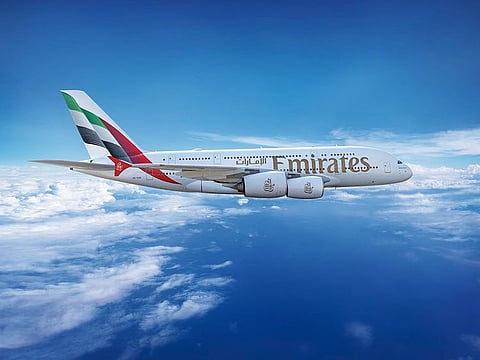Dubai’s Emirates to buy 5 Airbus aircraft from plane lessor Doric Nimrod Air Two
More UAE airlines are turning to leasing aircraft amid Boeing, Airbus delivery delays

Dubai: Guernsey-based investment company Doric Nimrod Air Two Ltd. has agreed to sell five of Airbus’ super jumbo A380s to Dubai’s Emirates for a combined value of $200 million.
The A380-861 aircraft are currently leased to Emirates and will be sold once the lease terms end between October 1 and November 30 this year, Doric Nimrod said in a statement on the London Stock Exchange on Wednesday.
Doric Nimrod Air Two, an investment company which trades its shares on the Specialist Fund Segment (SFS) of the London Stock Exchange’s (LSE) main market, buys, leases and then sells aircraft.
The statement explained that from October 2011 onwards, the company purchased seven Airbus A380-861 aircraft, each leased for twelve years to Emirates. The airline had earlier purchased two aircraft from the company in 2023.
Emirates, the world’s biggest operator of the Airbus A380s, will pay Nimrod $40 million per aircraft, the lessor said. The lessor also noted that the operating leases will continue as contracted until the lease date ends.
More airlines opt for leasing
Emirates has been expanding its jumbo jet fleet by acquiring aircraft from plane lessors as their lease expires. The French OEM stopped manufacturing the double-deckers in 2021. In an earlier interview with Gulf News, Sheikh Ahmed bin Saeed Al Maktoum, Chairman and Chief Executive of Emirates Airline and Group, said the airline would continue to expand its fleet with more A380s from lessors for ‘the right price. '
“The A380 will stay with us until at least 2035. We will continue to buy it for the right price,” Sheikh Ahmed said.
Dubai’s flagship carrier, Emirates, and airlines globally have struggled to expand operations amid delivery delays from plane makers Boeing and Airbus.
Airline President Tim Clark told reporters during the International Air Travel Association (IATA) in June this year that Emirates was likely to tap debt markets to finance new Airbus A350s and did not rule out a new bond issue. Emirates has also undertaken a multi-million dollar refurbishment project for its older aircraft to mitigate issues surrounding delivery delays.
Sharjah-based budget carrier Air Arabia has also promised to expand its fleet size to 90 aircraft by the end of 2024 by adding more leased planes. Airline CEO Adel Abdullah Ali said growth plans “will continue regardless” of jet delivery delays caused by ongoing “supply chain and geopolitical challenges.”
Boom in aircraft leasing sector
According to a CAPA—Centre for Aviation report published earlier this month, commercial aircraft lessors and their airline customers are benefiting from strong passenger demand. The lessors are also benefiting from the positive impact on lease rates and aircraft market values resulting from supply chain constraints, said CAPA.
The report suggests that AerCap leads the global aircraft leasing sector—by far the biggest player by fleet and revenue—but there is a clear top five of leading lessors (which also includes Air Lease Corporation, Avolon, BOC Aviation, and SMBC Aviation Capital).
These five have 31 per cent of lessor aircraft in service, but 48 per cent of lessor orders - this points to a further increase in their share of the world’s leased fleet in future. During the Farnborough Airshow in the UK earlier this year, Avolon announced orders for 310 new engines (160 GTF engines from Pratt & Whitney, and 150 LEAP-1A engines from CFM International) to power 155 Airbus A320neo family aircraft in its order book.
The leading lessors’ financial results were hit by the pandemic and the Russian aircraft crisis in 2022, but profits have recovered. Moreover, the credit ratings of the top five have remained in the investment grade. All five of the leading leasing companies reported positive net profits in 2023 after losses, or only very slim positive results, in 2022. Their collective net margin was 30.9 per cent, compared with -10.4 per cent in 2023.
Sign up for the Daily Briefing
Get the latest news and updates straight to your inbox



